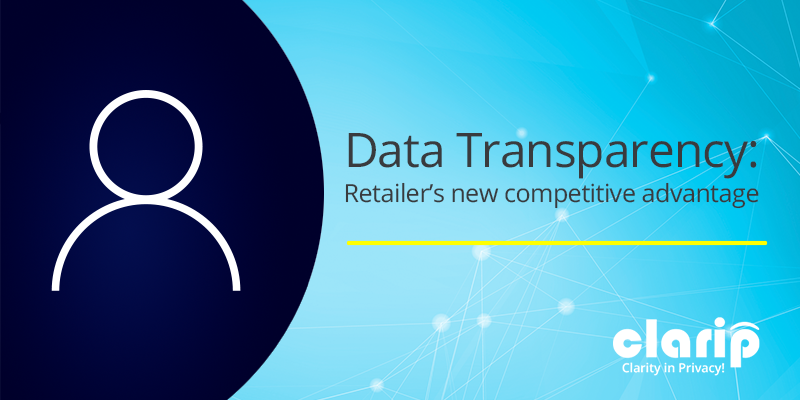Data Transparency: Retailer’s new competitive advantage

It’s been said that “Data is gold” in the retail industry. Back in 2017, The Economist published a story titled, “The world’s most valuable resource is no longer oil, but data.” Whatever value data represents in retailers’ quest for innovation in marketing, customer experience and product development, the data belongs to the consumer. Privacy regulations are informing consumers that their data is valuable, and data collectors should view consumer data as “gold with consent”.
Retailers and Emerging Data Privacy Regulations
The biggest impact for retailers is that new regulations directly affect virtually all business functions and their respective investments. From MarTech/AdTech to customer experience, troubleshooting, and ecommerce – specific departments will need their own respective data strategies, communicate between these departments, and ensure they comply with each jurisdiction they do business in. Hiring a Chief Privacy Officer and a privacy department is beneficial but establishing an ethical data collection practice (Privacy by Design and Consent Management), responding to consumer requests in a timely manner (DSRs), and maintaining data usage transparency (Privacy Policies) will need to be woven into the very fabric of organizations.
Retailers use consumer data to benefit customers
Retailers utilize consumer data to administer loyalty programs and provide other consumer benefit programs. Retailers are concerned with privacy regulations effecting strong customer relationships.
However, relationships will be strengthened with data privacy programs:
- When consumers are in a “shopping mindset” there is a contextual advertising opportunity.
- Superior first-party shopper data which allow advertisers to be as relevant and timely as possible. Not only does this mean more effectiveness in terms of conversions, but also more efficiency in terms of advertising dollars and ROI.
- Without third-party cookies, it offers advertisers viable reach, targeting and retargeting opportunities, wherever customers prefer to engage online or offline.
- It offers a stronger link between advertising and its outcomes and allows brands to build more performance-based campaigns and budgets.
Meeting the Data Privacy Challenges
Put the customer in control
Large data sets are great, but what if data collected for campaigns and experience is from your top customers? Allow customers to customize their experience as their expectations and needs change. Customers opting out aren’t looking for deals, savings, or points. Opting out in of itself is an important consumer metric.
Tools that regulators are requiring organizations to have will also become powerful tools for retail marketing strategies:
- Do Not Sell My Personal Information link in the footer
- Opt-Out of collection in a pop up
- Global Privacy Controls enabled
- Granular Preference Forms
- Data Subject Request Forms
Be mindful of consumer’s personal information
Marketing departments are asking consumers to disclose excessive amounts of personal information. State Attorney Generals and privacy regulators are mindful of this.
According to the CCPA: Personal information is information that identifies, relates to, or could reasonably be linked with you or your household. For example, it could include your name, social security number, email address, records of products purchased, internet browsing history, geolocation data, fingerprints, and inferences from other personal information that could create a profile about your preferences and characteristics.
Some categories of personal information are classified as sensitive personal information.
Create a clear value exchange
Don’t be afraid of cookie compliance, preference controls, and consumer consent, because in order to do business in certain states and countries, you must comply. This creates an opportunity to explain the consumer value exchange of data for better targeted advertising.
Get started immediately to see how easy it is to get value with data governance.
Communicate with consumers clearly and frequently
It is legally required for businesses to communicate their practices for data collection, sharing, first party and third-party usage, and violating these laws puts companies at risk. Communicating with customers about using data to create a better experience is simply a good practice, creating a retailer to consumer (B2C) trust experience.
Forward-thinking retailers with confidence-building at their core will seize the opportunity to define transparent, consumer-centric privacy standards. Don’t just comply, thrive.
6 critical and manageable elements for dynamic privacy with scalability:
1. Customers should have reasonable control, access, correction, and deletion rights of their personal information.
2. A sound privacy policy framework must be national in scope rather than a patchwork of fifty state laws. Strong, clear preemption of state laws is necessary to set clear expectations for all consumers nationwide and reduce state-level compliance burdens.
3. Accountability for all departments and third parties. Every sector within the data ecosystem should have a duty to its data subjects.
4. Risk-based approach to privacy is essential.
5. Incentives for Good Faith Actors. Be transparent and sincere in one’s business dealings and without a desire to defraud, deceive, take advantage of or in any way act maliciously towards consumers.
6. Strong and Fair Enforcement. Retailers should actively support fair, consistent, and equitable enforcement of privacy laws by the Federal Trade Commission and State Attorneys General.
Technology for the retail competitive advantage
Clarip’s Data Privacy Governance Platform ensures compliance with all consumer privacy regulations, including “Do Not Sell”. Allow customers to submit, revoke and update granular consent with Clarip Consent Management.
Click here to learn more about our Preference and Consent Management Platform! Clarip takes enterprise privacy governance to the next level and helps organizations reduce risks, engage better, and gain customers’ trust! Contact us at www.clarip.com or call Clarip at 1-888-252-5653 for a demo.

 Data Risk Intelligence
Data Risk Intelligence Automated Data Mapping
Automated Data Mapping Do Not Sell/Do Not Share
Do Not Sell/Do Not Share Cookie Banner Solutions
Cookie Banner Solutions Consent & Preferences
Consent & Preferences Data Rights Requests
Data Rights Requests
